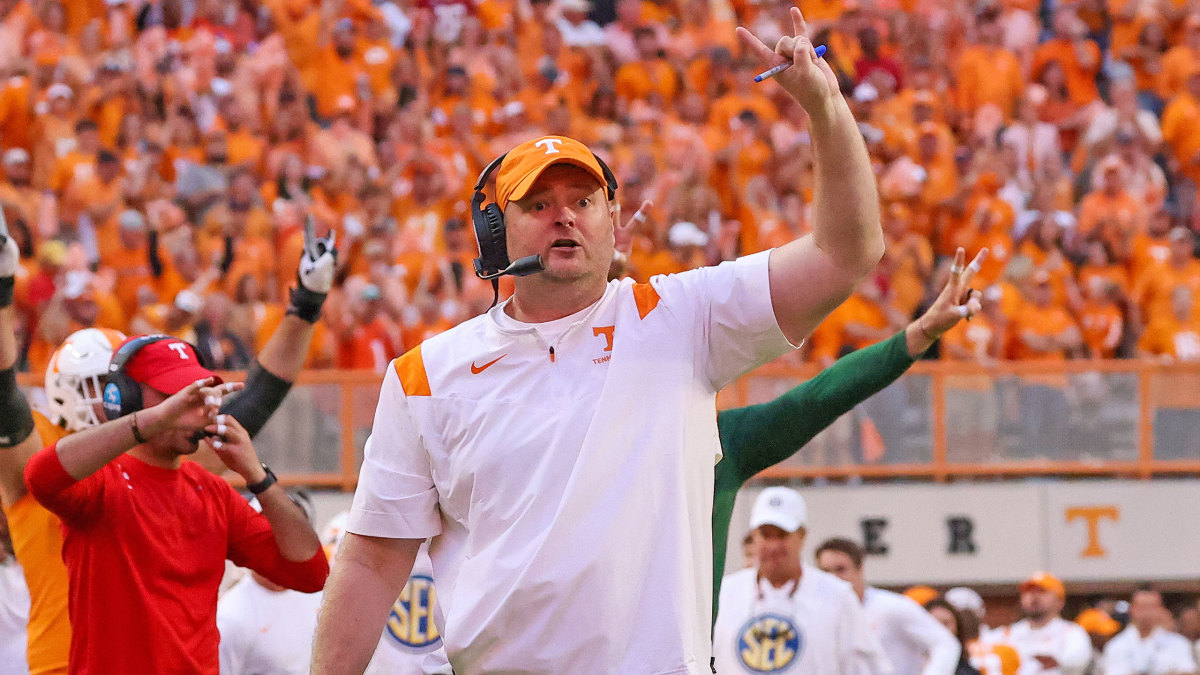Forde-Yard Dash: Why Josh Heupel’s Year 2 Success Could Mean Big Things
Forty names, games, teams and minutiae making news in college football (flashlights sold separately in Blacksburg, so Virginia Tech can find its way out of the basement it has fallen into):
MORE DASH: Week 7 Delivers | Playoff Picture | NIL Collectives
Fourth Quarter
The Second-Year Litmus Test
With Tennessee’s dazzling performance in upsetting Alabama and the Volunteers’ 6–0 start, it’s time to wonder whether coach Josh Heupel (31) is the next great one in his profession. A lot will depend on how the rest of this season transpires, of course, but so far the 44-year-old Heupel is checking boxes for the Second-Year Litmus Test.
We’ve seen it before: New coach comes into a traditional power program that has been performing below its traditional norm. He needs one year to establish his own culture—apologies for applying that trite and vague word, but it applies. In his second year, the program takes off.

Who else has followed that career arc? A few names you might recognize:
Kirby Smart (32), whose No. 1–ranked Georgia team figures to have a lot to say about how far this Tennessee run can go, started 8–5 with the Bulldogs. In his second year they went 13–2 and were a Tua Tagovailoa bomb in overtime away from winning the national title. Four years later, Smart got his title.
Smart, of course, was a protégé of Nick Saban, who had his own second-season flex in the SEC. Saban started 7–6 at Alabama, then went 12–2 in his second season. The Crimson Tide took an undefeated record into the SEC championship game in 2008 and battled eventual national champion Florida deep into the fourth quarter before submitting. In Year 3, Saban won the first of his six national titles at Alabama.
Speaking of that era of Florida football, Urban Meyer (33) was a Year 2 breakthrough guy there. He went 9–3 his first season, then the next season went 13–1 and won the national title in an upset of Ohio State. The coach he beat in the 2006 championship game was Jim Tressel (34), who catapulted from a 7–5 first season with the Buckeyes in ’01 to a 14–0 national title in ’02. (Tressel also went from 2–9 to 8–2 in his first and second seasons at Youngstown State, well before getting the Ohio State job.)
And two years before Tressel won the natty with the Buckeyes, Bob Stoops (35) did it in his second season at Oklahoma. Year 1 was a 7–5 labor, and Year 2 was a 13–0 masterpiece. His quarterback on that championship team? Josh Heupel.
Heupel was in his second season as the Sooners’ starting QB, after transferring in from junior college, when they won it all. That’s similar to Hendon Hooker’s path to Tennessee, arriving last year as a transfer from Virginia Tech. Saban had a second-year starter at QB on that 2008 team in John Parker Wilson. Craig Krenzel took over as the Ohio State starter late in Tressel’s first year, and that carried over into his second.
Looking elsewhere, should we be giving the same Year 2 breakthrough credit to Lane Kiffin (36) at Mississippi? Ole Miss doesn’t have the consistent, long-haul record of success as the other schools mentioned here, but his arc has been similar in Oxford. Kiffin’s first Ole Miss team went 5–5, then last year jumped up to 10–2 and a Sugar Bowl berth. This season the Rebels are, at present, the only undefeated team in the SEC West.
But not every second-season success story carries forward. Beware the Mel Tucker (37) false breakthrough. After the 2–5 pandemic season debut at Michigan State, the Spartans jumped up to 11–2 and a top-10 finish last year, prompting the school to massively overcompensate Tucker in a new contract. Year 3 has been a 3–4 bust, with all losses coming by double digits. (If Tucker wants to salvage this season, upsetting Michigan in Ann Arbor on Oct. 29 would go a long way.)
Watch Tennessee football with fuboTV. Start your free trial today.
Heupel’s agent will absolutely be asking for a massive contract extension—perhaps he already has—but Tennessee athletic director Danny White would be wise to keep the Tucker example in mind. Then again, White should also keep an eye on the situation at Heupel’s alma mater, Oklahoma. Brent Venables assuredly will get a second season leading the Sooners, but if 2023 goes poorly you’d have to wonder whether Oklahoma would try to bring Heupel home.
Coach Who Earned His Comp Car This Week
Sonny Dykes (38), TCU. Hey, maybe needing a second season before breaking through is for slow learners. Dykes is ruining the curve with the Horned Frogs, getting off to a 6–0 start with consecutive thriller victories over undefeated opponents. TCU went from taking down Kansas in Lawrence to rallying past Oklahoma State in Fort Worth. Thanks to Dykes’s sharp offensive mind, the Frogs are third nationally in scoring, third in total offense and second in yards per play. They are a fun team to watch and still have several big games ahead of them.
Coach Who Should Take the Bus to Work
Justin Wilcox (39), California. Dude, you just lost to Colorado.
Point After
When thirsty in the formerly square town of Salt Lake City, do not despair—there is beer to be found, and it is good. In particular, The Dash enjoyed Fisher Brewing Company (40), a cool spot with a panoply of brewed options. Order a Citra Bomb Tom IPA, grab a chicken sandwich from the Cluck Truck outside and thank The Dash later.
MORE DASH: Week 7 Delivers | Playoff Picture | NIL Collectives
